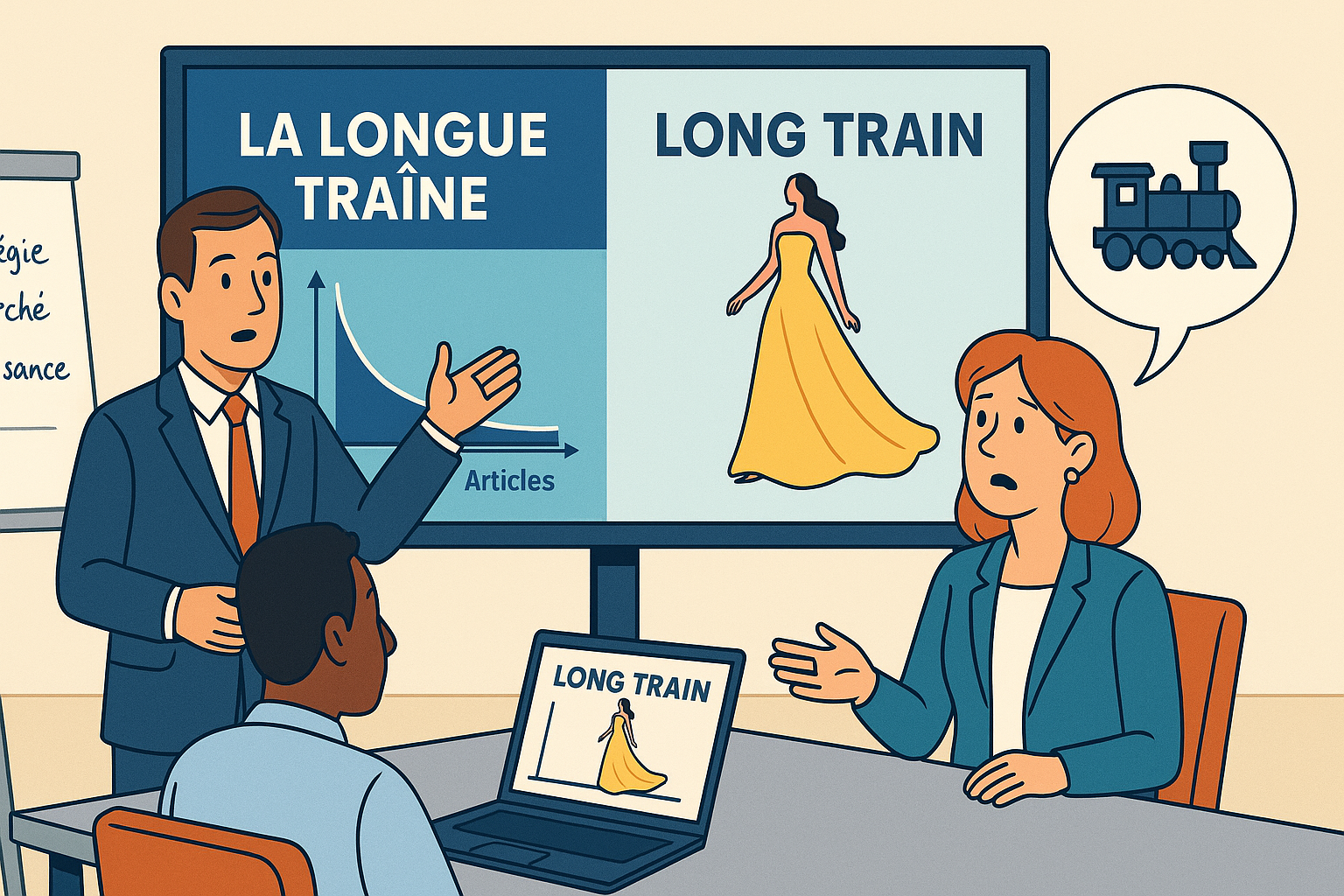French business expressions English speakers always get wrong — professional guide (A2–B2)
Professional French contains dozens of expressions that English speakers mistranslate or misuse in workplace contexts. This comprehensive guide identifies the most common mistakes in meetings, emails, and negotiations, provides correct translations with pronunciation, and offers practical strategies for communicating professionally in French business environments.

Why business French poses unique translation challenges
Professional French operates under different conventions than casual conversation, with specific expressions, formal registers, and cultural expectations that don’t map directly onto English business language. English speakers often assume business vocabulary translates literally or that English business terms work in French with minor pronunciation adjustments. These assumptions create frequent misunderstandings in professional contexts.
French business culture emphasizes formality, indirect communication, and relationship-building more than Anglo-American business cultures prioritize efficiency and directness. This cultural difference manifests linguistically through longer email openings, more elaborate meeting protocols, and carefully constructed expressions softening requests or disagreements. Understanding these cultural-linguistic patterns prevents unintentional rudeness or confusion.
Additionally, false friends proliferate in business vocabulary because both languages borrowed from Latin and share commercial history. Words appearing identical carry different meanings, creating professional miscommunication more embarrassing than casual conversation errors. Mastering authentic business French requires dedicated study beyond general language proficiency.
Meeting expressions that confuse English speakers
Faire le point /fɛʁ lə pwɛ̃/
Literal translation: “To make the point”
Actual meaning: To review the situation, take stock, summarize where things stand
Why it confuses: English speakers think this means “make a point” (argumentative) when it actually means reviewing progress or summarizing status neutrally.
⚠️ Common mistake: Using “faire le point” when you want to argue a position. This expression is about status updates, not making arguments.
🇫🇷 FR (WRONG) — Je veux faire le point que notre stratégie est bonne. ❌
🇫🇷 FR (RIGHT) — Faisons le point sur l’avancement du projet. ✅ /fəzɔ̃ lə pwɛ̃ syʁ lavɑ̃smɑ̃ dy pʁɔʒɛ/
🇺🇸 EN — Let’s review the project progress.
🇫🇷 FR (for arguing) — Je voudrais souligner que notre stratégie est efficace. /ʒə vudʁɛ suliɲe kə nɔtʁ stʁateʒi ɛt‿efikas/
🇺🇸 EN — I’d like to emphasize that our strategy is effective.
Assurer le suivi /asyʁe lə sɥivi/
Literal translation: “To ensure the follow”
Actual meaning: To follow up, monitor progress, ensure continuity
Why it confuses: English speakers often say “faire un follow-up” mixing French and English, which sounds unprofessional. The correct French expression uses “suivi” not “follow-up.”
🇫🇷 FR — Je vais assurer le suivi de ce dossier. /ʒə vɛ asyʁe lə sɥivi də sə dɔsje/
🇺🇸 EN — I’ll follow up on this file/project.
Reporter une réunion /ʁəpɔʁte yn ʁeynjɔ̃/
Literal translation: “To report a meeting”
Actual meaning: To postpone/reschedule a meeting
Why it confuses: “Reporter” is a false friend. It doesn’t mean “report” (compte rendu) but “postpone/delay.” English speakers incorrectly use “reporter” when they mean “faire un compte rendu.”
🇫🇷 FR — Nous devons reporter la réunion à jeudi. /nu dəvɔ̃ ʁəpɔʁte la ʁeynjɔ̃ a ʒødi/
🇺🇸 EN — We need to reschedule the meeting to Thursday.
🇫🇷 FR (for “report”) — Je vais faire le compte rendu de la réunion. /ʒə vɛ fɛʁ lə kɔ̃t ʁɑ̃dy də la ʁeynjɔ̃/
🇺🇸 EN — I’ll write up the meeting report.
Prendre la parole /pʁɑ̃dʁ la paʁɔl/
Literal translation: “To take the word”
Actual meaning: To speak up, take the floor, begin speaking (in a meeting)
Why it confuses: English speakers don’t have an equivalent set phrase for “beginning to speak in a formal setting,” leading them to use awkward literal translations.
🇫🇷 FR — Puis-je prendre la parole pour ajouter quelque chose ? /pɥiʒ pʁɑ̃dʁ la paʁɔl puʁ aʒute kɛlkə ʃoz/
🇺🇸 EN — May I speak / add something?
Email expressions that cause confusion
Suite à votre email /sɥit a vɔtʁ‿imɛl/
Literal translation: “Following your email”
Actual meaning: Following up on your email, in response to your email
Why it confuses: English speakers often write “Après votre email” (after your email) which sounds awkward. “Suite à” is the professional standard for responding to correspondence.
🇫🇷 FR — Suite à votre email du 15 novembre, je vous confirme notre accord. /sɥit a vɔtʁ‿imɛl dy kɛ̃z nɔvɑ̃bʁ ʒə vu kɔ̃fiʁm nɔtʁ‿akɔʁ/
🇺🇸 EN — Following up on your email of November 15th, I confirm our agreement.
Dans l’attente de votre retour /dɑ̃ latɑ̃t də vɔtʁ ʁətuʁ/
Literal translation: “In the waiting of your return”
Actual meaning: Looking forward to your response, awaiting your reply
Why it confuses: This formal closing phrase has no direct English equivalent. English speakers often write “J’attends votre réponse” which is too direct and informal for professional French.
🇫🇷 FR — Dans l’attente de votre retour, je vous prie d’agréer mes salutations distinguées. /dɑ̃ latɑ̃t də vɔtʁ ʁətuʁ ʒə vu pʁi daɡʁee me salytasjɔ̃ distɛ̃ɡe/
🇺🇸 EN — Looking forward to your response. Best regards.
💡 Email tip: French professional emails require more formal openings and closings than English. Always use “Madame, Monsieur” rather than “Bonjour” for first contact with unknown recipients.
Transmettre un message /tʁɑ̃smɛtʁ œ̃ mɛsaʒ/
Literal translation: “To transmit a message”
Actual meaning: To pass along a message, forward information
Why it confuses: English speakers say “passer un message” (literally “pass a message”) which works colloquially but “transmettre” is more professional for business contexts.
🇫🇷 FR — Pourriez-vous transmettre ce document à l’équipe commerciale ? /puʁje vu tʁɑ̃smɛtʁ sə dɔkymɑ̃ a lekip kɔmɛʁsjal/
🇺🇸 EN — Could you forward this document to the sales team?
Negotiation and discussion expressions
Mettre sur la table /mɛtʁ syʁ la tabl/
Literal translation: “To put on the table”
Actual meaning: To bring up for discussion, put forward a proposal
Why it confuses: While this translates similarly to English “put on the table,” English speakers often forget to use “mettre” and incorrectly say “poser sur la table” which sounds odd in this context.
🇫🇷 FR — Je voudrais mettre une nouvelle proposition sur la table. /ʒə vudʁɛ mɛtʁ yn nuvɛl pʁɔpɔzisjɔ̃ syʁ la tabl/
🇺🇸 EN — I’d like to put forward a new proposal.
Trouver un terrain d’entente /tʁuve œ̃ tɛʁɛ̃ dɑ̃tɑ̃t/
Literal translation: “To find common ground”
Actual meaning: To reach an agreement, find compromise
Why it confuses: English speakers correctly understand this but often use “compromis” alone, missing the more elegant “terrain d’entente” which implies mutual understanding rather than just compromise.
🇫🇷 FR — Nous devons trouver un terrain d’entente qui satisfasse les deux parties. /nu dəvɔ̃ tʁuve œ̃ tɛʁɛ̃ dɑ̃tɑ̃t ki satisfas le dø paʁti/
🇺🇸 EN — We need to find common ground that satisfies both parties.
Donner son feu vert /dɔne sɔ̃ fø vɛʁ/
Literal translation: “To give one’s green light”
Actual meaning: To give approval, greenlight a project
Why it confuses: This expression works similarly in both languages, but English speakers often say “donner l’accord” which is correct but less idiomatic than “feu vert” in business French.
🇫🇷 FR — La direction a donné son feu vert pour le nouveau projet. /la diʁɛksjɔ̃ a dɔne sɔ̃ fø vɛʁ puʁ lə nuvo pʁɔʒɛ/
🇺🇸 EN — Management has given the green light for the new project.
Time and deadline expressions
Dans les meilleurs délais /dɑ̃ le mɛjœʁ delɛ/
Literal translation: “In the best delays”
Actual meaning: As soon as possible, at your earliest convenience
Why it confuses: English speakers want to say “aussitôt que possible” (as soon as possible) which sounds too urgent. “Dans les meilleurs délais” is more diplomatic and professional.
🇫🇷 FR — Merci de me faire parvenir ces documents dans les meilleurs délais. /mɛʁsi də mə fɛʁ paʁvəniʁ se dɔkymɑ̃ dɑ̃ le mɛjœʁ delɛ/
🇺🇸 EN — Please send me these documents at your earliest convenience.
D’ici la fin de la semaine /disi la fɛ̃ də la səmɛn/
Literal translation: “From here the end of the week”
Actual meaning: By the end of the week, before the week ends
Why it confuses: English speakers often say “avant la fin de la semaine” (before the end of the week) which is correct but “d’ici” is more commonly used for deadlines in professional French.
🇫🇷 FR — Je vous enverrai le rapport d’ici vendredi. /ʒə vuz‿ɑ̃vɛʁe lə ʁapɔʁ disi vɑ̃dʁədi/
🇺🇸 EN — I’ll send you the report by Friday.
Request and obligation expressions
Serait-il possible de… /səʁɛ til pɔsibl də/
Literal translation: “Would it be possible to…”
Actual meaning: Could you possibly… (very polite request)
Why it confuses: English speakers underestimate French business formality and use “Pouvez-vous…” (Can you…) which is too direct. The conditional “serait-il” adds necessary politeness.
🇫🇷 FR — Serait-il possible de décaler notre rendez-vous à mercredi ? /səʁɛ til pɔsibl də dekale nɔtʁ ʁɑ̃devu a mɛʁkʁədi/
🇺🇸 EN — Would it be possible to move our meeting to Wednesday?
Je me permets de… /ʒə mə pɛʁmɛ də/
Literal translation: “I allow myself to…”
Actual meaning: I’m taking the liberty of… (polite introduction to request or suggestion)
Why it confuses: This phrase has no English equivalent. It softens requests or interventions, making them sound less presumptuous. Essential for professional French communication.
🇫🇷 FR — Je me permets de vous contacter concernant le poste vacant. /ʒə mə pɛʁmɛ də vu kɔ̃takte kɔ̃sɛʁnɑ̃ lə pɔst vakɑ̃/
🇺🇸 EN — I’m reaching out to you regarding the vacant position.
Common false friends in business French
⚠️ Critical mistakes: These false friends cause the most professional embarrassment. Memorize the correct usage to avoid serious misunderstandings.
| French Word | English speakers think | Actually means | Correct French for |
|---|---|---|---|
| Actuellement | Actually | Currently | En fait / En réalité |
| Assister à | To assist | To attend | Aider |
| Demander | To demand | To ask | Exiger |
| Éventuellement | Eventually | Possibly | Finalement |
| Formation | Formation/Creation | Training | Création / Constitution |
| Librairie | Library | Bookstore | Bibliothèque |
| Location | Location | Rental | Emplacement / Lieu |
| Rester | To rest | To stay/remain | Se reposer |
Strategies for mastering business French expressions
Build a professional phrase bank
Create a personal collection of frequently-used business expressions organized by context—meetings, emails, negotiations, presentations. Include pronunciation (IPA), example sentences, and notes about formality levels. Review this phrase bank weekly, adding new expressions as you encounter them in authentic professional contexts. This systematic approach builds confidence faster than scattered vocabulary learning.
Study French business email templates
Collect sample French business emails from colleagues or online resources covering common situations: meeting requests, project updates, polite refusals, deadline extensions. Analyze the structure, opening/closing formulas, and standard expressions. Create templates for situations you encounter regularly, adapting them as needed while maintaining appropriate formality and cultural conventions.
Practice register switching
French business contexts demand formal register proficiency. Practice converting casual French into professional equivalents. For example, transform “Tu peux m’envoyer le document?” into “Pourriez-vous me faire parvenir le document?” This skill prevents inappropriate casualness in professional settings while maintaining your ability to build rapport through appropriate informal speech when suitable.
💡 Practice tip: Record yourself delivering common business phrases, then compare to native speaker recordings. Focus on intonation patterns that convey politeness and professionalism beyond just word choice.
Learn from authentic business content
Consume French business media regularly—Le Figaro Économie, Les Échos, French business podcasts. Note recurring expressions, observe how professionals construct arguments, and pay attention to transitional phrases. This exposure builds intuition for natural business French that textbooks cannot provide. Even 15 minutes daily with French news sources accelerates professional vocabulary acquisition.
Cultural context for business expressions
Formality and hierarchy
French business culture maintains stronger hierarchical distinctions than Anglo-American workplaces. This manifests linguistically through consistent “vous” usage with colleagues, more elaborate email greetings, and indirect communication patterns softening requests or criticism. Understanding these cultural expectations prevents unintentional disrespect even when your grammar and vocabulary are technically correct.
Building relationships before business
French professionals typically invest more time in relationship-building before discussing business directly. Expect longer social preliminaries in meetings, more personal small talk in emails, and patience with process. Expressions like “Je me permets de vous contacter” acknowledge this cultural preference for established relationships over transactional efficiency.
Written vs. spoken business French
Written business French maintains greater formality than spoken equivalents. Email expressions like “Je vous prie d’agréer mes salutations distinguées” rarely appear in speech, where simpler closings suffice. Conversely, meeting discussions allow more informal expressions once rapport establishes. Recognizing this written/spoken divide prevents overly stiff speech or inappropriately casual writing.
Common situations and appropriate expressions
Making requests politely
🇫🇷 FR (informal) — Tu peux m’aider ? /ty pø mɛde/
🇺🇸 EN — Can you help me?
🇫🇷 FR (professional) — Pourriez-vous m’aider, s’il vous plaît ? /puʁje vu mɛde sil vu plɛ/
🇺🇸 EN — Could you help me, please?
Declining requests diplomatically
🇫🇷 FR — Je crains que ce ne soit pas possible pour le moment. /ʒə kʁɛ̃ kə sə nə swa pa pɔsibl puʁ lə mɔmɑ̃/
🇺🇸 EN — I’m afraid that’s not possible at the moment.
🇫🇷 FR — Malheureusement, je ne suis pas disponible à cette date. /malœʁøzmɑ̃ ʒə nə sɥi pa dispɔnibl a sɛt dat/
🇺🇸 EN — Unfortunately, I’m not available on that date.
Expressing disagreement professionally
🇫🇷 FR — Je comprends votre point de vue, cependant… /ʒə kɔ̃pʁɑ̃ vɔtʁ pwɛ̃ də vy səpɑ̃dɑ̃/
🇺🇸 EN — I understand your point of view, however…
🇫🇷 FR — Permettez-moi de suggérer une alternative. /pɛʁmɛte mwa də syɡʒeʁe yn altɛʁnativ/
🇺🇸 EN — Allow me to suggest an alternative.
Study glossary — business expressions reference
| FR | IPA | EN |
|---|---|---|
| Faire le point | /fɛʁ lə pwɛ̃/ | Review status / Take stock |
| Assurer le suivi | /asyʁe lə sɥivi/ | Follow up |
| Reporter une réunion | /ʁəpɔʁte yn ʁeynjɔ̃/ | Reschedule a meeting |
| Prendre la parole | /pʁɑ̃dʁ la paʁɔl/ | Take the floor / Speak |
| Dans l’attente de votre retour | /dɑ̃ latɑ̃t də vɔtʁ ʁətuʁ/ | Awaiting your response |
| Mettre sur la table | /mɛtʁ syʁ la tabl/ | Put forward / Bring up |
| Trouver un terrain d’entente | /tʁuve œ̃ tɛʁɛ̃ dɑ̃tɑ̃t/ | Find common ground |
| Donner son feu vert | /dɔne sɔ̃ fø vɛʁ/ | Give green light / Approve |
| Dans les meilleurs délais | /dɑ̃ le mɛjœʁ delɛ/ | As soon as possible |
| Je me permets de | /ʒə mə pɛʁmɛ də/ | I’m taking the liberty of |
| Compte rendu | /kɔ̃t ʁɑ̃dy/ | Report / Minutes |
| Ordre du jour | /ɔʁdʁ dy ʒuʁ/ | Agenda |




